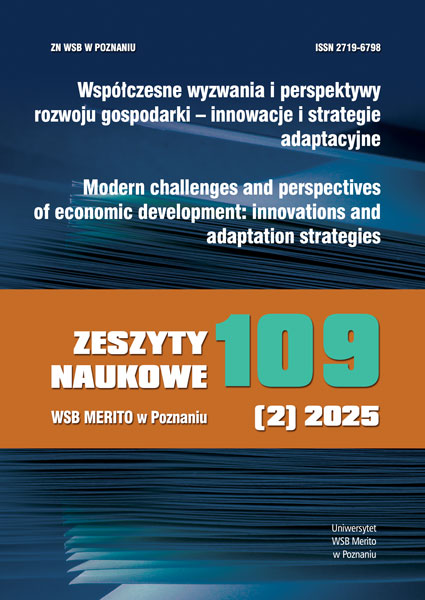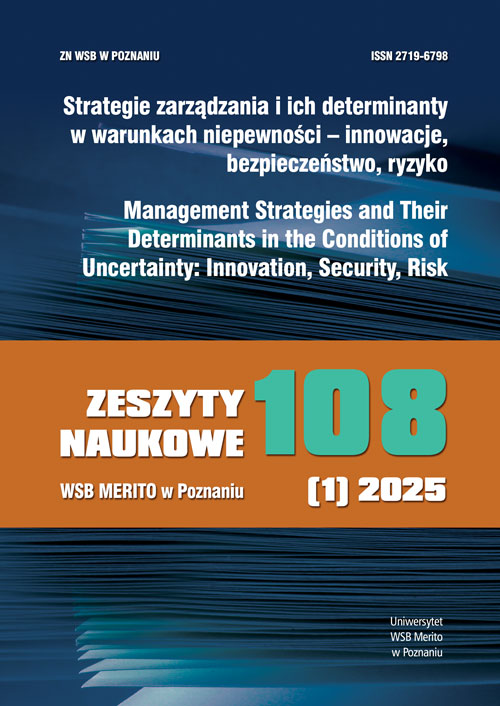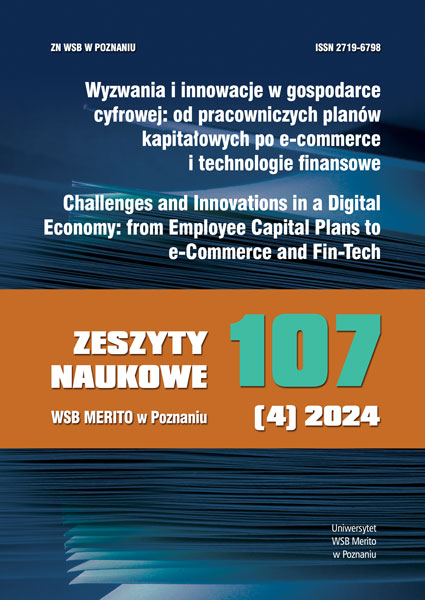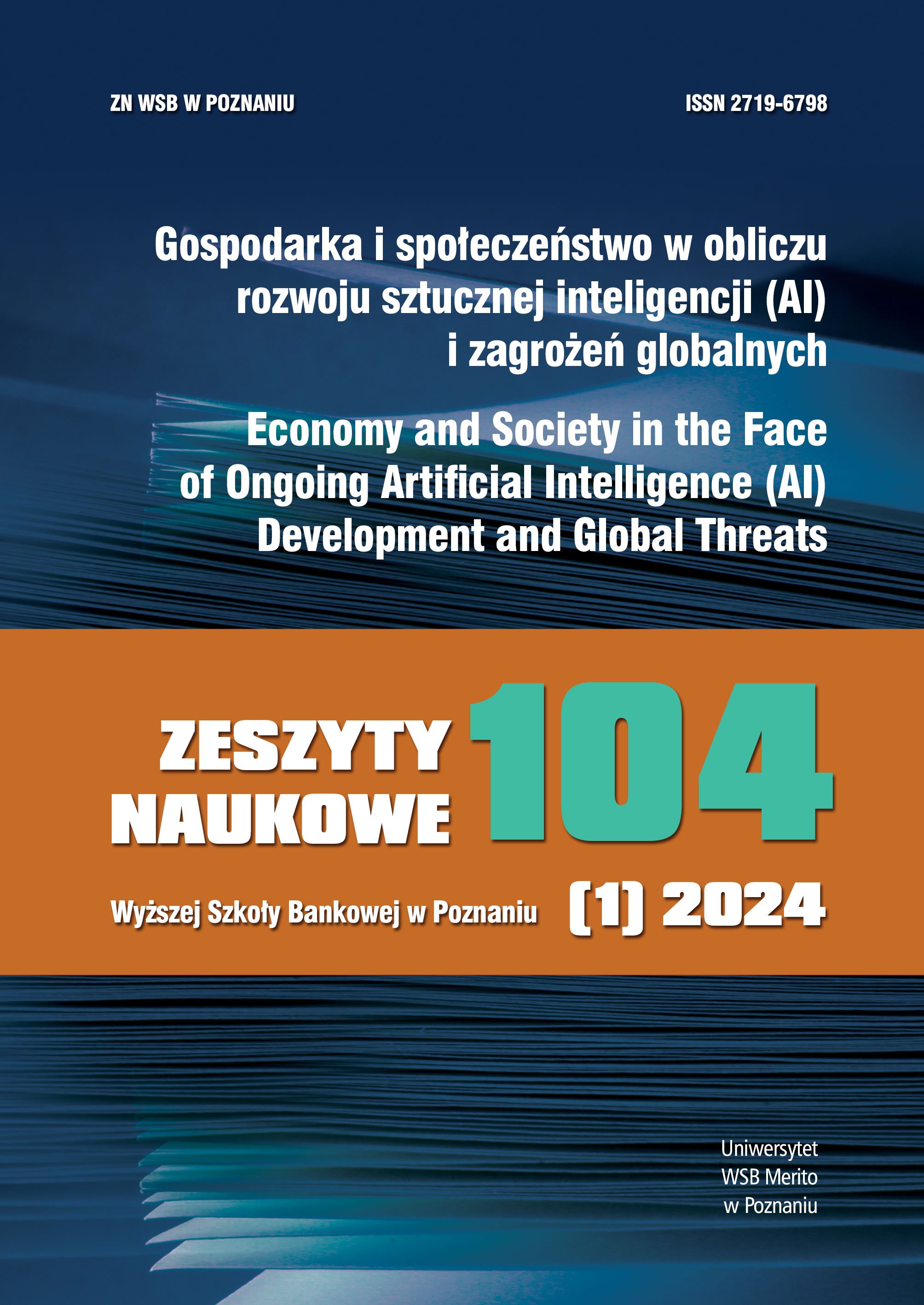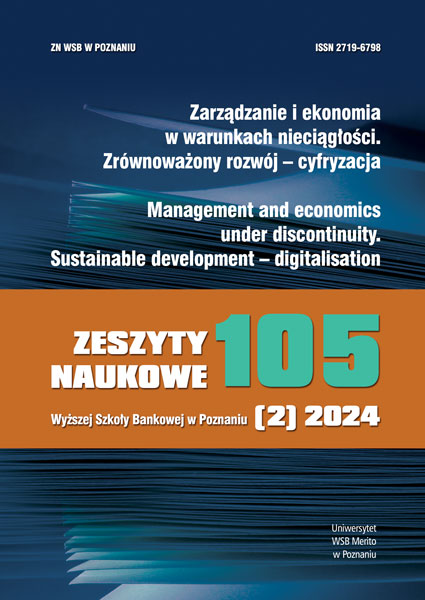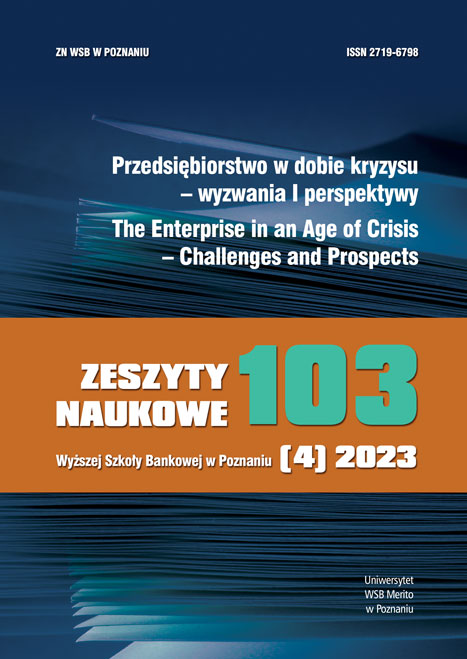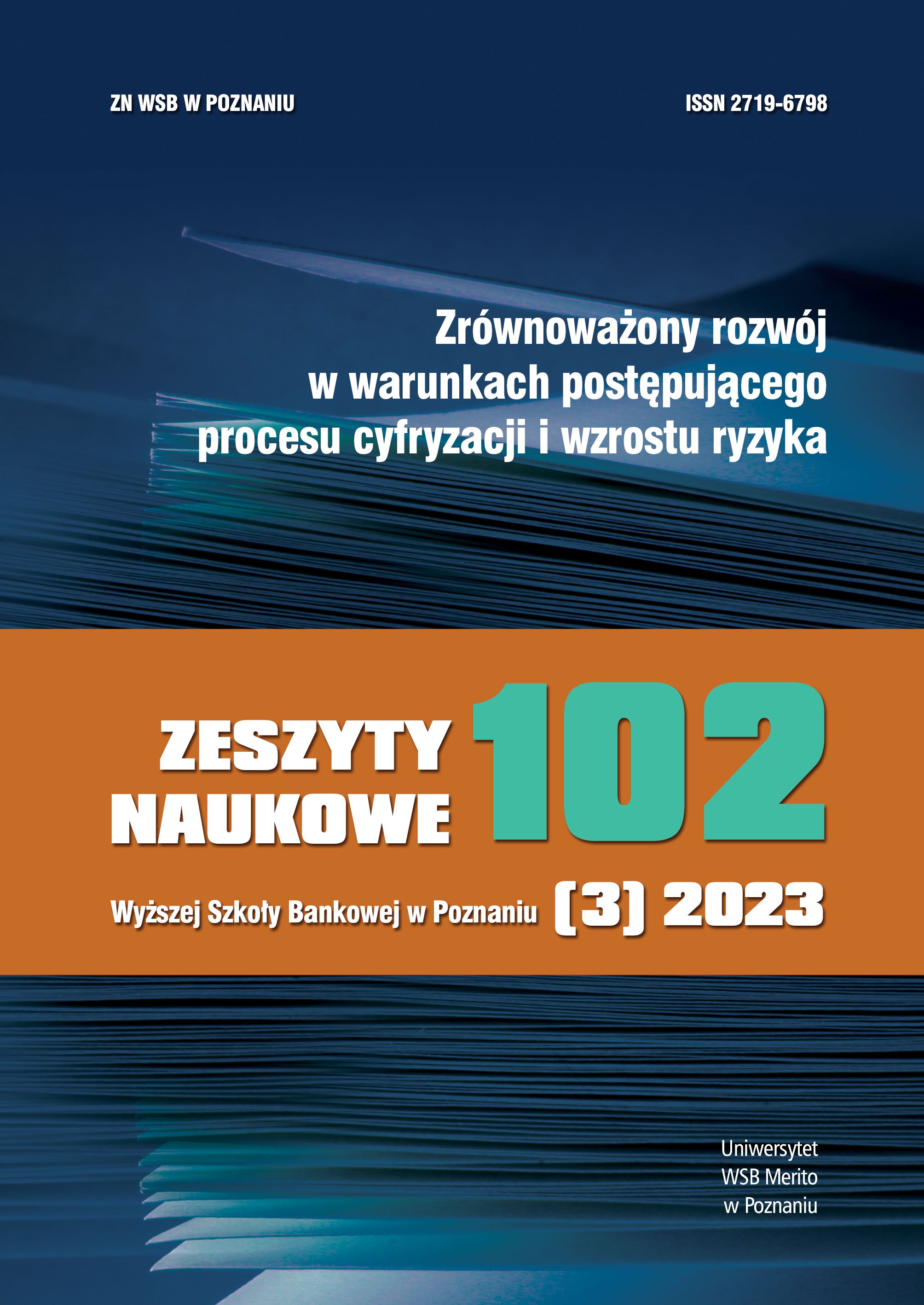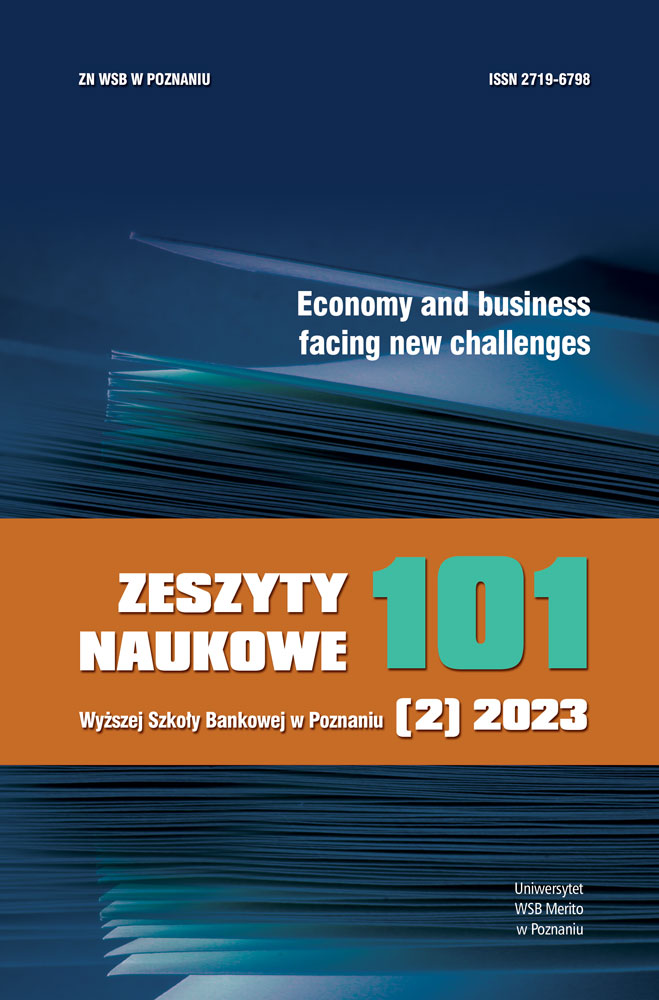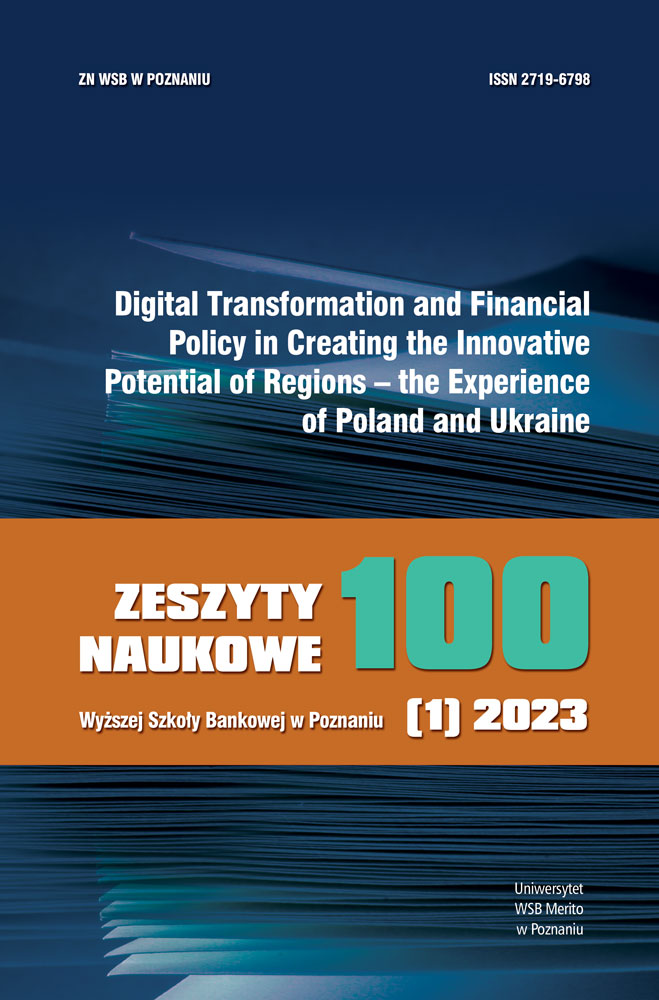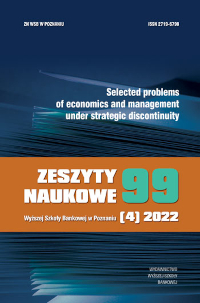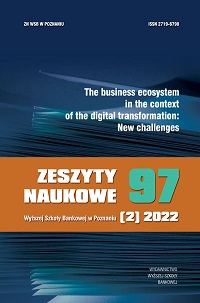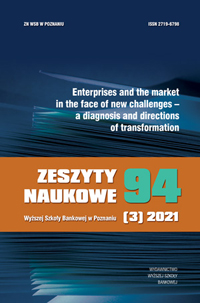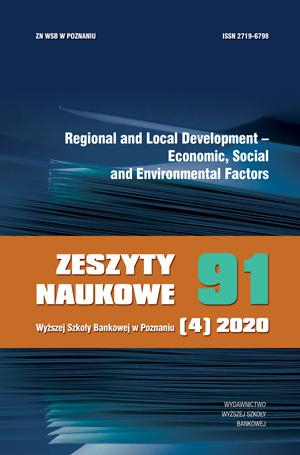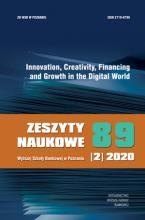Archives
Vol. 109 No. 2 (2025)
Współczesne wyzwania i perspektywy rozwoju gospodarki - innowacje i strategie adaptacyjne
In an age of globalization, international conflicts, and growing digitalization, the
economy must keep adapting to new, increasingly unpredictable conditions to
ensure stable growth, competitiveness, and resilience to crises.
The articles in this issue address these challenges by presenting key problems
related to economic development in conditions of uncertainty that state institutions,
businesses, and even members of society have to face. Although the studies
contained in this volume do not exhaust the topic, they may be of interest not
only to academic researchers and students of economics, but also to business
practitioners, politicians, public sector employees, and those concerned with
health and economic security.
Svitlana Ishchuk, Lyubomyr Sozanskyy
Vol. 108 No. 1 (2025)
Management strategies and their determinants in the conditions of uncertainty – innovation, security, risk
There is no doubt that modern businesses and institutions have to operate in a volatile and unpredictable environment, which is associated with a number of challenges. Globalisation, rapid technological development, changing customer expectations and growing competition are just some of the main factors that affect the modern economy. In addition, companies have to meet the requirements of sustainable development and cyber security and keep innovating. In order to be able to operate in such conditions, it is necessary to understand the main challenges that shape the future of businesses and institutions and develop effective coping strategies.
The article presented in this volume address some of the problems, namely:
- ways in which Ukrainian companies adapt to difficult conditions, in particular strategies of risk management during the war and the need to introduce innovative solutions such as automation and digital transformation,
- the influence of marketplace platforms and artificial intelligence on business models, marketing and consumption patterns, which necessitate a greater deal of flexibility and innovation on the part of market participants,
- implementation of DevSecOps practices in critical cloud-based infrastructure,
- problems of risk management in financial institutions and the existence of an early warning system in the case of crisis events,
- analysing and modelling public debt in in the Western Balkan countries,
- the role of public image and microeconomic strategies in the legal services market.
Although the analyses presented in this volume provide only a snapshot of the complex reality, their results and conclusions that can be drawn from them are likely to serve as a source of inspiration for practitioners, students and scientists interested in these topics.
Vol. 107 No. 4 (2024)
WYZWANIA I INNOWACJE W GOSPODARCE CYFROWEJ: OD PRACOWNICZYCH PLANÓW KAPITAŁOWYCH PO E-COMMERCE I TECHNOLOGIE I TECHNOLOGIE FINANSOWE
W XXI wieku gospodarka i społeczeństwo stają w obliczu wielu poważnych wyzwań,
ktore kształtują nową rzeczywistość. Technologie cyfrowe dynamicznie
zmieniają sposob działania przedsiębiorstw oraz to, jak konsumenci dokonują
zakupow i korzystają z usług. Poszerza się przestrzeń świata wirtualnego, ktory
stwarza nowe możliwości, ale staje się rownież źrodłem zagrożeń.
Wejście do tego świata wymaga stałego rozwijania kompetencji i podnoszenia
świadomości cyfrowej. To oznacza konieczność nie tylko systematycznego poszerzania
wiedzy, ale także ciągłego poszukiwania nowych narzędzi pozyskiwania,
rozwijania i wykorzystania informacji.
Nie można zapominać rownież o wyzwaniach związanych ze zmianami klimatycznymi,
ktore w coraz większym stopniu wpływają na gospodarki na całym
świecie. Europa zmaga się ze starzejącymi się społeczeństwami oraz konfliktem
zbrojnym na Ukrainie. Wszystko to przekłada się na niepewność, zakłocając poczucie
bezpieczeństwa. Stąd też wokoł zagrożeń i środkow mogących poprawić
bezpieczeństwo ogniskują się wspołczesne badania.
Prezentowane w tym tomie artykuły wpisują się we wskazany nurt, poruszając
problemy związane z:
▶ luką w wiedzy na temat jednego z programow zabezpieczenia emerytalnego
— PPK
Roman Garbiec w artykule Niewiedza jako determinant uczestnictwa w Pracowniczych
Planach Kapitałowych (PPK) wykazuje, że decyzje o przystąpieniu do PPK
w głownej mierze oparte są na przypadkowej i fragmentarycznej wiedzy na temat
planu, pracownicy kierują się nierzadko opiniami innych osob (niekoniecznie
specjalistow w tej dziedzinie) bądź też motywowani są perspektywą dopłat ze
strony państwa i składek płaconych przez pracodawcę.
informacyjno-
komunikacyjnych w celu poprawy dostępności usług medycznych
Karolina Sokołowska w tekście Zdrowie w sieci — wykorzystanie internetu przez
pacjentów i jego wpływ na dostępność usług medycznych analizuje sposoby wykorzystania
internetu przez pacjentow, identyfikuje korzyści oraz potencjalne zagrożenia
wynikające z dostępu do usług medycznych online. Badania te stają
się podstawą do stwierdzenia, że pomimo wielu zagrożeń rozwoj telemedycyny
jest nieuniknionym trendem, ktory powinien być promowany i doskonalony, co
zwiększy dostępność usług medycznych.
▶ przetwarzaniem informacji cyfrowych w systemach wczesnego ostrzegania
Dariusz Drzewiecki w artykule Metodyka przetwarzania informacji cyfrowych
w systemach ostrzegania o ekstremalnych zjawiskach pogodowych prezentuje informacje
na temat sposobow pozyskiwania, przetwarzania i obrazowania cyberdanych
w ramach polityki bezpieczeństwa, mającej na celu ochronę społeczeństwa,
gospodarki i środowiska przed niebezpiecznymi zjawiskami pogodowymi. Publikacja
zawiera rownież analizę modeli numerycznych wykorzystywanych do
monitorowania i prognozowania pogody. Autor stwierdza, że nawet najbardziej
zaawansowane systemy ostrzegania dają „tylko” więcej czasu na przygotowanie,
by ograniczyć straty ludzkie i materialne w wypadku wystąpienia katastrofalnych
zjawisk. Poprzez inwestycje w infrastrukturę możemy minimalizować skutki takich
zdarzeń, znaleźć schronienie w przypadku alarmu. Ważne, aby umieć zachować
się w sytuacji kryzysowej oraz wiedzieć, gdzie i w jaki sposob szukać pomocy.
▶ poszukiwaniem nowych sposobow edukacji z wykorzystaniem narzędzi AI
W tekście Postawy studentów wobec narzędzi AI Grzegorz Matłach stawia pytanie,
jak edukować młodzież na temat właściwego i etycznego korzystania z narzędzi
AI. Na podstawie poczynionych analiz i obserwacji autor wyprowadza
wniosek, że uczelnie wyższe powinny przygotować pakiet szkoleń zarowno dla
studentow, jak i dla nauczycieli akademickich w zakresie regulacji prawnych oraz
etycznego stosowania AI. Jednocześnie uczelnie stoją przed koniecznością opracowania
polityki dotyczącej użytkowania narzędzi AI. Jej brak może przełożyć
się negatywnie na rzetelną ocenę wkładu studenta w pogłębianie swojej wiedzy
i realizację obowiązkow edukacyjnych.
▶ wdrażaniem innowacyjnych technologii przez polski sektor bankowy
Sylwia Stachera-Włodarczyk w tekście Innowacje technologiczne w polskim sektorze
usług bankowych wykazuje, że sektor bankowy jest jednym z najbardziej
innowacyjnych sektorow gospodarki. Inspiracją do wprowadzania nowych roz wiązań są stale zmieniające się oczekiwania klientow. Efektem tego jest m.in.
modernizacja tradycyjnych form bankowości i zastosowanie elektronicznych
kanałow dystrybucji oraz cyfrowych metod płatności. Rozwoj technologii mobilnych
w znacznym stopniu przyczynia się do zmian w prowadzonym przez banki
marketingu czy obsłudze klienta. Autorka konkluduje, że wraz ze wzrostem możliwości
technologicznych oraz popularyzacją urządzeń mobilnych funkcjonalność
samoobsługi może decydować o przewadze konkurencyjnej banku.
Innowacje w sektorze bankowym, w tym w szczegolności płatności mobilne,
są rownież przedmiotem opracowania Marty Rybińskiej Rola systemu BLIK oraz
innych form cyfrowych płatności bezgotówkowych w Polsce w opinii użytkowników.
Autorka śledzi rozwoj wspomnianych metod płatności na przestrzeni ostatnich
lat i porusza problem zagrożeń bezpieczeństwa wynikających z ich używania.
Analizując wyniki przeprowadzonych badań ankietowych, stwierdza, że płatności
mobilne przez zdecydowaną większość ankietowanych postrzegane są jako
bezpieczne, co świadczy o rosnącym zaufaniu do transakcji bezgotowkowych.
▶ rozwojem rynku internetowego i wyzwaniami, przed jakimi rynek ten staje
Anna Padlowska w artykule Wyzwania i perspektywy rozwoju rynku handlu internetowego
koncentruje się na analizie rynku e-commerce. Wykazuje, że dynamiczny
rozwoj tego rynku w ciągu ostatnich kilku lat wpłynął na wzrost gospodarczy na
całym świecie. Dostępność internetowa coraz większej liczby produktow i usług
sprzyja konkurencyjności i podnoszeniu jakości oferowanych dobr.
▶ rozwojem wymiany międzynarodowej Yuliia Poliakova, Oksana Shayda, Natalia Drebot i Mariana Myronova (ForeignTrade Relations of Ukraine with the EU Countries) analizują cechy i perspektywy rozwojuhandlu zagranicznego Ukrainy z kluczowymi partnerami handlowymi w UE.
Autorki budują model ekonometryczny zależności PKB Ukrainy od wskaźnikow
eksportu towarow do UE i importu towarow z UE w latach 2012–2023. Wykazują
pozytywny wpływ wzrostu wymiany towarow z UE na gospodarkę Ukrainy. Biorąc
pod uwagę wspołczesne cechy i problemy rozwoju handlu zagranicznego Ukrainy
w kontekście czynnikow globalnych oraz pełnoskalowej inwazji Rosji, autorki
wskazują możliwości integracji z rynkami europejskimi oraz priorytet wspołpracy
europejskiej w zagranicznej polityce gospodarczej Ukrainy.
Chociaż zebrane w tomie opracowania stanowią jedynie migawkę złożonej
rzeczywistości, przedstawione przez autorow analizy i wnioski mogą być ciekawe
zarowno dla praktykow, studentow, jak i naukowcow zainteresowanych wskazanymi
obszarami.
Svitlana Ishchuk, Lyubomyr Sozanskyy
The rapid advances of new technologies[1] penetrating into, and being embraced in, nearly all aspects of life, resulting in growing demand for specialized knowledge traversing a variety of domains are just some of the challenges that humans living in developed 21st century societies have to face. In a globalized world marked by volatility, communities are increasingly interconnected by an ever expanding web of economic, political, strategic and educational linkages. Roland Robertson argues that the globalization process leads to the compression of the world and the intensification of consciousness of the world as a whole[2]. At the same time, cultural practices, traditions, and identities – once unique – have begun to gradually converge toward standardization and homogeneity. As the Internet unfolds its homogenizing effect on language patterns across the globe, the communication process is substantially affected by the pace of change, too.
In a world of inevitably converging cultures and accelerating technological transformation, the role of specialized languages appears to be gaining a new meaning and increased importance. These languages, often intrinsically inscribed in the specific needs of different sciences and industries, reflect a mosaic of actors and stakeholders in the global marketplace. The emergent and strengthening interdependencies amongst these can bring benefits as well as create barriers to the communication process. Hence, the study of specialized languages can provide a framework for effective communication between experts in different fields, as well as between insiders and outsiders, the specialist and the lay.
The papers comprised in this volume share a focus on an in-depth understanding of the dynamics of specialized languages in educational, professional and cultural contexts, as well as addressing the practical challenges of teaching and translation.
The development of specialized linguistic competence, which seems critical for effective communication in areas such as law, technology or medicine, is analyzed in Eliza Borczyk’s article. The author demonstrates that the accurate conveyance of information in specialized texts may be conditional on the ability to aptly use specific syntactic structures, such as nominalization, elision, or subordinate clauses in compound sentences. Olga Ranus-Witkowska examines the role of coaching in the process of teaching intercultural communication in business settings, and discusses new trends in the teaching of professional languages. The inclusion of intercultural elements modifies the role of the teacher, who becomes a facilitator in the learning process. Natalia Szkop draws on recent research to look at the potential of ChatGPT 3.5 as a tool supporting the preparation of lesson plans in adult education. Melanie Ellis and Natalia Pająk concentrate on the acquisition of specialized technical vocabulary. The chapter reports the findings of a study that sought to identify the most effective techniques of learning and involved a series of tests alongside a short-term educational intervention. The study proved that the best effects were attained through repetition based on bilingual wordlists.
Rafał Matusiak underscores the role of nominalization in the specialized language of the legal profession, specifically in British “legalese”, overviewing its benefits and risks. While on the one hand, he concludes, nominalization helps reduce subjectivity by giving messages an impersonal tone, and makes it possible to condense information; on the other hand, if used in excess, it might easily produce ambiguity. The study highlights the prevalence of nominalization in legal discourse and the differences between its functions and the role of verbs.
The volume also includes papers exploring the relationships between language and culture. Marta Banaś, Daria Socha and Emilia Krawczyk investigate the function of ethnolects – Silesian and Catalan – as tools for building local identity and their potential role in achieving regional autonomy. The research, funded under a scholarship and conducted at the University of Silesia, shows how language policy can support the preservation of cultural diversity. In the same vein, Amani Bara portrays the interactions between language and culture in the multilingual songs of Saint Levant, an artist of diverse Palestinian-Serbian-French-Algerian heritage. The study, based on corpus analysis, demonstrates how linguistic choices reflect and shape cultural identities. The impact of cultural change on men’s and women’s discourse is also discussed in the article by Grzegorz Wlaźlak and Alicja Piekacz. The authors examine the language of presentations given by male and female students at selected universities to discover whether and how gender differences show in formal settings. The observations did reveal certain gender-dependent contrasts between communication styles, some of which, however, might be traceable to the distinctive features of the Polish academic language.
Two of the articles comprised in this volume fall within broadly conceived translation studies. Marta Banaś undertakes an analysis of the translation of neologisms found in Frank Herbert’s Dune, thus highlighting the challenges inherent in preserving their cultural and philosophical content. Fidelity of melic translation is addressed by Mikołaj Woźniak’s research. Employing an extended version of Low’s Pentathlon Principle, the author proposes a model for assessing the quality of song translations and, in an attempt to validate it, applies it to the Polish translations of Coldplay’s A Sky Full of Stars. The analysis proves the usefulness of multi-level assessment tools in quantifying translation quality.
With the growing awareness of gender identity and the ongoing debate over discrimination against non-binary individuals, the issue of translating gender-neutral language becomes increasingly relevant, particularly in the context of English-language media and their translation into Polish. Anna Szkonter-Bochniak, Magdalena Kowalska and Emilia Kuzior present the outcomes of their extensive research in this area, delivering a thorough description of the translation strategies identified.
The articles collected in this volume show specialized languages as a multidimensional phenomenon that combines theoretical research with practical implications in teaching and translation studies. We hope that the collection offers insights that will be valuable to a broad audience of researchers, teachers, translators, and to all those interested in specialized languages in their diverse contexts and applications.
Maria Banaś, Jarosław Szostak
December 2024
[1] J. Rozenfeld: Eastern European Struggles to Redefine the Local in a Globalized World. [In] Postmillenial Trends in Anglophone Literatures, Cultures and Media. S. Šnircová, S. Tomaščiková (eds). Cambridge Scholars Publishing 2019, pp. 233-234; J. Rozenfeld, S. Tomaščiková: The Lovable Machine. Social Implications of Implementing Artificial Intelligence: A Cultural Studies Perspective. “Ostrava Journal of English Philology” 2023, Vol. 15(2), pp. 77-92.
[2] E. Jacobs: The Homogenizing and Diversifying Effects of Migration Policy in the Internationalization of Higher Education. „Higher Education” 2022, Vol. 83, pp. 339–355. https://doi.org/10.1007/s10734-020-00658-4
Vol. 105 No. 2 (2024)
Management and economics under discontinuity. Sustainable development - digitalisation
In the face of challenges like the war in Ukraine and the digital transformation,
sustainability, more than ever, is seen as a key prerequisite of socio-economic
development. The articles included in the current issue offer an overview of theoretical
and empirical perspectives on the problems associated with ensuring the
sustainable development of an economy in the conditions of discontinuity. The
findings presented by the authors confirm the need to continue research efforts in
order to develop an interdisciplinary and multi-dimensional approach to sustainable
management and finances at the level of companies and regions.
In the article entitled Payment Security in the Digital Age, M. Lotko identifies factors
influencing users’ sense of security and their concerns related to electronic
payments. Based on a review of the literature and results of a questionnaire survey,
the author concludes that by educating users about banking security standards
and encouraging them to regularly change passwords, their level of trust
towards digital payments and the level of transaction security can be increased.
The benefits and threats associated with artificial intelligence are discussed
by W. Ilnicka. The article provides examples of how this technology has revolutionised
many aspects of modern life by offering greater efficiency, convenience
and personalization. However, all these innovations could disrupt the existing
labour market and raise serious privacy concerns given the large and constantly
growing amount of data processed by AI.
- Kozłowska-Makoś analyses the impact of transfer pricing on the effectiveness
of ES G reporting in capital groups and identifies key trends and relationships
between transfer pricing policies and ESG indicators. She concludes that
that a transparent way of establishing transfer prices has a positive effect on the
perception of ESG reports but its implementation is associated with additional
costs and regulatory complexity.
In the article entitled Public Procurement Procedures from the Perspective of Construction
Contractors, M. Blaszke focuses on problems associated with the interpretation
of tender documentation, offer submission and contract implementation.
Based on questionnaire data, the author concludes that efforts to streamline
tender procedures, improve their transparency and adapt them to market needs
market can help to improve the efficiency of the public procurement system and
increase the level of satisfaction for all those involved in the investment processes.
In his article G. Chrobak describes results of a study analysing different scenarios
for estimating the amount of corporate income tax. The author identifies
temporary differences in the reported value of projected deferred tax assets,
which depend on the predetermined gross profit/loss and fluctuations in the
amount of tax differences.
- Purzyński analyses to what extent an increase in the percentage of income
tax transferred to public benefit organizations has affected their income from this
source. In addition to describing changes in relevant regulations, the author looks
at empirical data for 2010–2024 to determine the scale of the impact.
The article entitled Listing Act — A (R)evolution in the Capital Market, by
- Purzyński describes the current situation of the Warsaw Stock Exchange regarding
capital acquisition opportunities available to businesses. The author identifies
the most significant legal changes introduced by the new regulatory framework,
particularly from the perspective of issuers.
It is the hope of the journal’s editorial board that the articles included in the
current issue will be interest to its readers and will inspire scientific debate and
further research.
Mariola Grzebyk
Izabela Krawczyk-Sokołowska
Introduction
Faced with modern economic challenges, entrepreneurs have to meet growing demands and adapt to the changing reality. This issue of the journal focuses on various aspects of business operation in the context of the COVID-19 pandemic, climate change, the war in Ukraine, and other factors affecting business development.
The authors[1] of the article entitled Sustainable Development in Business Practice: Ecological Awareness and Legal Knowledge of Polish Entrepreneurs report results of an online survey undertaken to assess the level of ecological awareness of Polish entrepreneurs and their knowledge of regulations that determine their environmental obligations. The study’s findings reveal a moderate level of ecological awareness, with evident gaps regarding the knowledge of regulations and lack of compliance, especially among representatives of small and medium-sized enterprises (SME). The authors conclude that there is a need to expand the current offering of trainings and educational programs in this area.
In the following article entitled Economic freedom and climate change its author[2] undertakes a critical analysis of claims put forward in the liteature on climate change and the consequences of global warming, as well as proposed solutions to the problem and their impact on the market economy. He concludes that the free market economy favours the search for and implementation of technological solutions that effectively mitigate the negative effects of climate change.
The third article[3] examines the impact of the COVID-19 pandemic on business strategies of small and medium-sized companies as well as available ways of obtaining public funds for their implementation. The author concludes that after the outbreak of the COVID-19 pandemic, the MSE sector faced new challenges that required financial support from the state, which enabled many companies in this group to survive the crisis.
The article[4] entitled Determinants of the primary health care infrastructure in district towns of Śląskie Province during the Covid-19 pandemic reports results of a statistical analysis based on a ranking of 19 towns in terms of the density of primary health care facilities at two points during the COVID-19 pandemic. The results indicate that the density of health care facilities between 2020 and 2022 is correlated with three explanatory variables, namely the number of kindergartens per 1 km2, the number of completed apartments per 1 km2 and the length of the gas network in km per 1 thousand inhabitants. A comparison of the corresponding rankings reveals changes that took place between the references years.
In her article entitled Financial and non-financial reports prepared by economic entities during the Russian aggression against Ukraine[5], the author discusses problems caused by Russia's aggression against Ukraine and reflected in companies’ financial statements, which reveal how the military conflict has undermined the economic stability of many companies. The study is based on information included in the notes to financial statements and in the Management Board Report of the LPP S.A. Capital Group for 2022/23.
The growing demand for automation has resulted in the widespread use of technologies, such as artificial intelligence and machine learning, for industrial development and logistics. In her article entitled Robotization - a revolution and its impact on our lives[6], the author discusses how the application of intelligent robots has affected productivity, competitiveness and the way companies exploit automation to increase efficiency, economic effectiveness and, ultimately, their profits. Robotization in various areas of life is motivated by public well-being, consumer satisfaction and environmental sustainability.
The ongoing process of digital transformation, which is affecting business processes, is the main topic of last article[7] included in this volume, namely Beyond Optimization: The Evolving Role of Business Process Management in Industry Transformation. The author examines the shift from traditional paradigms to holistic and innovative approaches, positioning the BPM approach as a catalyst for enduring organizational transformation. The analysis is based on a series of case studies that showcase various applications and positive outcomes of transformative BPM initiatives and illustrate the changing landscape of Industry 4.0-5.0, the integration of emerging technologies like AI, IoT, and Blockchain, and anticipated trends, emphasizing BPM’s role as a strategic enabler of innovation, agility, and sustainability.
Insights offered by the articles in this issue can help us to better understand the challenges faced by modern companies and to find effective ways of solving them. They are therefore likely to be of interest not only to scientists and students but also to entrepreneurs wishing to become more familiar with contemporary business management problems.
[1] A. Bernaciak, K. Kowol, Sustainable Development in Business Practice: Ecological Awareness and Legal Knowledge of Polish Entrepreneurs
[2] A. Pietrasz, Zmiany klimatyczne a wolność gospodarcza
[3] M. Banasik, Wpływ pandemii COVID-19 na działalność przedsiębiorstw z sektora MMŚP
[4] G. Chrobok, Determinanty infrastruktury podstawowej opieki zdrowotnej w miastach powiatowych województwa śląskiego wobec pandemii SARS-CoV-2
[5] K. Barczyk, Raporty finansowe i niefinansowe w sporządzane przez jednostki gospodarcze w warunkach rosyjskiej agresji na Ukrainę
[6] M. Florczak-Strama, Robotyzacja – rewolucja i jej wpływ na nasze życie
[7] A. Kernytska, Beyond Optimization: The Evolving Role of Business Process Management in Industry Transformation
Vol. 102 No. 3 (2023)
Zrównoważony rozwój w warunkach postępującego procesu cyfryzacji i wzrostu ryzyka
Introduction
Sustainable development is important not only as a solution to problems of the present but also as a strategy for the future of our planet. In the face of global challenges, such as climate change, economic crises or public health threats, we need to make informed and responsible decisions taking into account the overall impact of our activities on the social, economic and natural environment. For this to happen, it is necessary to continue public and scientific discourse regarding sustainable development and to promote policies and initiatives that support it.
In the context of challenges such as the war in Ukraine and digital transformation, sustainable development is key to ensuring socio-economic stability. In particular, this means that decisions made at micro and macro levels need to strive for a balance between economic, social and environmental considerations. For example, when analysing the effects of the war on the Ukrainian economy and the growing importance of digital technologies, one cannot forget the role played by sustainable development as a pillar of a long-term development strategy. The articles presented in this volume address some of these challenges.
Their authors focus on various aspects of sustainable development, ranging from an analysis of regional economic inequalities in Ukraine (S. Ishuchuk), through risk reporting in business (K. Barczyk), to the role of banks in supporting activities which are in line with ESG principles (Ł. Dwojak). The task of building a sustainable future requires good relationships with stakeholders and properly trained employees in cyber security (M. Fuksiewicz); it is also associated with the development of artificial intelligence (Ł. Makowski). Given the changing needs and expectations of consumers and employees and the changing realities of education, there is a need for new solutions to support sustainable socio-economic development. (W. Ilnicka, R, Grabiec). In order to a build knowledge-based society capable of innovation, it is crucial to find ways in which students can be motivated to choose technical and engineering fields (Wojtowicz, Wachnicka).
All these areas require cooperation and involvement of various stakeholder groups who can jointly create a safe future based on sustainable development. The articles included in this issue are likely to prove useful not only to scientists, but also to students and practitioners interested in the concept of sustainable development and its applications to ensure the socio-economic stability and protect the natural environment in the face of the challenges of the modern world.
Vol. 100 No. 1 (2023)
Digital Transformation and Financial Policy in Creating the Innovative Potential of Regions - the Experiences of Poland and Ukraine.
Zeszyt Naukowy pod redakcją:
Wiesława Caputa
Uniwersytet WSB Merito w Poznaniu
ul. Powstańców Wielkopolskich 5
61-895 Poznań
e-mail: journals@poznan.merito.pl
Uniwersytet WSB Merito w Poznaniu / WSB Merito University
ul. Powstańców Wielkopolskich 5
61-895 Poznań
Copyright 2022 by Uniwersytet WSB Merito w Poznaniu / WSB Merito University
OJS Support and Customization by LIBCOM
Platform & Workfow by OJS/PKP

 Język Polski
Język Polski
 English
English

